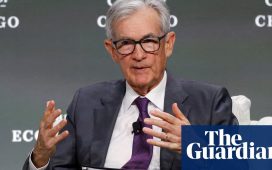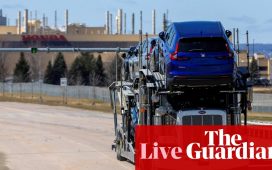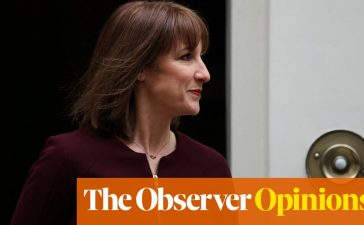Key events
-
Closing summary
-
France, Italy and others taken to task by EU over ‘excessive’ deficits
-
Young’s hopes for summer boost from Euros and Olympics
-
NatWest first major mortgage lender to cut rates ahead of BOE meeting
-
Farmers warn of future potato shortages
-
Just 13% of top roles at listed UK firms held by women – report
-
Amazon UK workers begin vote on gaining union recognition for first time
-
‘Glacial’ progress on levelling up in UK means more resources needed – IFS
-
George Iacobescu retires from Canary Wharf Group, replaced by Nigel Wilson
-
Labour pledges to strengthen economic watchdog within first 100 days
-
Berkeley returns to build-to-rent market amid London housing shortage
-
UK factory gate price inflation picks up in May
-
UK house prices grow faster, rental growth eases
-
‘France: Politics takes a leap into the unknown’
-
Seven EU countries, including France, to face deficit procedure
-
Upbeat inflation news may be too little, far too late for Sunak
-
Inflation drop ‘sets the stage’ for August rate cut – CBI
-
Markets expect first rate cut by September, another one by December
-
Breakfast cereal, crisps, vegetables become cheaper
-
Food price rises ease to lowest rate since 2021
-
UK inflation slows to official target of 2% for first time since 2021
-
Unsecured household debt to rise by £1,660 this year – TUC
-
Introduction: UK inflation expected to fall back to official 2% target
Closing summary
The shadow chancellor, Rachel Reeves, has said pressure on household finances remains “acute” despite official figures showing UK inflation fell to 2% in May, returning to the official target rate for the first time in nearly three years.
The Office for National Statistics (ONS) said the consumer prices index (CPI) had eased in May, down from 2.3% in April, raising expectations of a cut in borrowing costs by the Bank of England.
Lower prices growth will give encouragement to Rishi Sunak after the prime minister made bringing inflation under control one of his main aims. The release of the inflation figures represents one of the last significant economic indicators before the vote on 4 July.
Our other main stories today:
Thank you for reading. We’ll be back tomorrow. Take care! – JK
France, Italy and others taken to task by EU over ‘excessive’ deficits

Larry Elliott
France has become one of seven European Union countries to be named and shamed over the size of its budget deficit in a move that could put Paris on a collision course with the European Commission.
Brussels announced that it was opening disciplinary action against France, Belgium, Italy, Hungary, Malta, Poland and Slovakia for running excessive budget deficits that are above the EU limit of 3% of national income.
Under the terms of the EU’s excessive deficit procedure, the seven countries identified will have to provide a plan of the corrective action they will take and the policies they will implement to bring their deficits below the 3% limit. The Commission will issue proposals on how fast the deficit should be cut in November, with 0.5% of GDP annual cuts as a benchmark.
Euro-area countries that do not follow up on the recommendations would potentially face fines.
Despite planned spending cuts, the International Monetary Fund estimates France’s deficit will fall gradually from the 5.5% of GDP reached in 2023, 5.3% of GDP this year and 4.5% of GDP by 2027.
But opinion polls suggest Marine Le Pen’s National Rally (RN) party – which plans to cut taxes and – is set for big gains in the looming parliamentary elections.
Leo Barincou, senior economist at the consultancy Oxford Economics, said:
The gradual fiscal consolidation planned by the current government will be the first casualty of the political crisis, worsening France’s already fraught public finances.
A divided parliament is unlikely to be able to agree on politically difficult spending cuts, which would result in a higher deficit than our current baseline. Meanwhile, the implementation of the RN platform as it currently stands would add to the public deficit.
Young’s hopes for summer boost from Euros and Olympics
Young & Co’s Brewery has posted rising sales in recent weeks and was hopeful of higher summer sales thanks to the Euro football tournament, Wimbledon and the Olympics, followed by the autumn rugby internationals.
The British pub group said total sales climbed 24% year-on-year in the nine weeks from 1 April, with like-for-like sales (at pubs open at least a year) up 2.4%.
Pubs have struggled with high energy and wage costs and the lacklustre economic backdrop but are now looking forward to a summer of sport.
Chief executive Simon Dodd said:
Looking ahead, we face some challenges, but there is plenty for us to be excited about this year.
NatWest first major mortgage lender to cut rates ahead of BOE meeting
NatWest has become the first major mortgage lender to cut its rates ahead of tomorrow’s Bank of England’s interest rate decision, where the central bank is widely expected to leave borrowing costs unchanged at 5.25%. However, a fall in inflation back to its 2% target has boosted hopes of a rate reduction at its next meeting in August.
NatWest is lowering fixed-rate deals by as much 0.17 percentage points from tomorrow. its largest cuts are for people who are remortgaging and opting for a five-year fix, with the leading rate at 4.41%.
Smaller lenders have also cut their rates this week, with the Co-operative Bank lowering the cost of mortgage loans by up to 0.22 percentage points and Nottingham Building Society reducing deals by 0.24 points.
Farmers warn of future potato shortages
Farmers have warned that there could be shortages of British potatoes in the future due to extreme weather conditions and increased cost of production for farmers.
The National Farmers Union (NFU) has now called on politicians to take action action and “Save our Spuds” after drought, floods and months of heavy rain this season, had led to significant delays in the harvesting and planting of potato crops.
It also comes as potato farmers have seen the costs of production increase by 28% in the past two years.
Alastair Heath, vice chair of the NFU’s potato policy group, said:
A number of growers have made the difficult choice to reduce production to minimise losses, and the relentless wet weather has put many more growers weeks behind schedule. For some, profits have been all but wiped out. Business confidence is low and investment has become a far-away concept, which is putting pressure on British potato supplies in the short-term.
While it’s unlikely to lead to empty shelves this year, this pressure on the homegrown crop is an indication that we need urgent action to prevent the situation getting worse. I believe we can and should be self-sufficient in potatoes.
Just 13% of top roles at listed UK firms held by women – report
Just 13% of top roles at listed UK companies are held by women and less than 1% are held by women of colour, according to the annual Women on Boards report.
At companies listed on the FTSE or AIM, only 13% of the top jobs – chief executive, chair, chief financial officer and senior independent director – are held by women (436 women across 3,452 roles), said the report by WB Directors.
This includes just 25 women of colour, 0.7% of the total. At Britain’s biggest listed companies on the FTSE 100, the proportion of senior roles held by women of colour is 1.5%. This compares with 0.3% at the smaller businesses listed on AIM.
This is despite the FTSE Women Leaders Review introducing a focus on these four roles and the Financial Conduct Authority going further to set a target for firms to have at least one woman in these positions.
The FTSE 100 has 24% of women in the top four board roles – close to the target of one of the four. The FTSE 250 has 19.6% of women in the top four roles and the FTSE SmallCap fares slightly better at 21.7%.
However, the two most senior roles of chair and CEO are those with the least female representation, at just 7.9% and 6.8% respectively across FTSE All-Share and AIM listings.
More than a third (35%) of FTSE All-Share firms have not reached the target of having a board made up of 40% or more women, and this is worse for smaller companies listed on AIM, where 88% are falling short of the target.
The number of AIM companies with all-male boards has shot up to more than a third (35%), from 18% last year (187 firms).
Fiona Hathorn, chief executive of WB Directors, said:
Targets and scrutiny have resulted in hard-fought gains at FTSE 350 level. However, it’s time to extend focus to the smaller listed companies and ensure that efforts to monitor board diversity are intersectional across gender and ethnicity. There is a persistent underrepresentation of women and especially women of colour in positions of power.
We need firms across the FTSE SmallCap and AIM to urgently act on creating greater diversity at all levels. Measure it, report it, make it public – or the laggards will continue to simply opt out.
Amazon UK workers begin vote on gaining union recognition for first time
Amazon workers in the UK have come a step closer to gaining union recognition for the first time as officials from the GMB arrive at the tech firm’s Coventry depot to kick off a month-long ballot process.
Officials from the union are to visit the West Midlands site on Wednesday after the GMB was granted the right to hold the legally binding ballot by the independent Central Arbitration Committee. Amazon had rejected a request for voluntary recognition.
If staff vote to support recognition, the GMB would be given the right to represent them in negotiations over pay and conditions, marking the first time Amazon has recognised a union in the UK.
From today, more than 2,000 staff will be invited to a series of 45-minute meetings with union representatives – and separate gatherings with the company – at which the two sides will make their case.
Voting will then take place in the workplace from 8 July, with the result announced after 15 July.
Amanda Gearing, a senior GMB organiser, said:
Amazon is one of the world’s most hostile and anti-union employers. They’re a multi-billion-pound global company investing huge energy to resist efforts by working-class people in Coventry to fight for a better life.
But Coventry Amazon workers have rejected Amazon’s attempts to smash their union. Now Amazon workers, not the bosses, will decide.
‘Glacial’ progress on levelling up in UK means more resources needed – IFS
Progress towards a series of levelling up goals set by the UK government has been “glacial”, and achieving them by the target date of 2030 will require a big increase in resources for struggling areas, a leading thinktank has said.
The Institute for Fiscal Studies (IFS) said that, on many measures, regional inequality had widened and the UK had gone into reverse.
In 2022, the government set out a white paper containing 12 goals aimed at “levelling up” the UK.
While praising the clarity and ambition of the plan, the thinktank said the Covid-19 pandemic and the cost of living crisis had combined to make the period since the last election, in 2019, a challenging time to make good on the Conservative party’s pledge to narrow the UK’s geographic divisions.
The white paper’s missions included goals for primary school attainment, public transport use, high-quality skills training and employment; however, the IFS report found that:
-
The share of pupils in England meeting expected standards at the end of primary school dropped from 65% in 2018–19 to 60% in June 2023, against a target of 90% by 2030. In only 10 English local authorities – all in London – did at least 70% of 11-year-olds meet this target.
-
The total number of further education and skills courses completed in England fell by 14% between 2018–19 and 2022–23. In the lowest skilled areas, the decline was almost 20%. The goal for 2030 is to have 200,000 more people successfully completing high-quality skills training annually, driven by 80,000 more people completing courses in the lowest skilled areas.
-
A 21-percentage-point gap in the average employment rate between the best and worst-performing local authority areas in the UK – the widest it has been since at least 2005. The aim is to have rising pay, employment and productivity in every area of the UK, and a smaller gap between the top performing areas and others.
-
The Conservatives’ aim is for local transport connectivity across England to be significantly closer to the standards of London, but the gap between the use of public transport in London (39% of journeys) and in the rest of the country (7%) during 2022-23 was at its second-widest level since 2002–03, as passenger numbers failed to recover to pre-pandemic levels.
The media group which owns the Daily Telegraph newspaper tumbled into the red last year after it set aside nearly £280m to cover loans made to the Barclay family which may not be repaid.
The group said that, despite a resilient financial performance, it had made losses of £244.6m in 2023 – against profits of £33.3m in the previous year – due to the provision.
Telegraph Media Group accounts show that a £277.6m provision has been taken against amounts due from parent company undertakings “with the ongoing corporate transaction casting doubt over the recoverability of this balance”.
The Telegraph on its own website reported that the provision had come as a result of “loans extracted by the Barclay family which are unlikely ever to be repaid”.
The future ownership of the Telegraph titles and the Spectator magazine has been uncertain since June 2023, when the titles were seized by Lloyds bank after the Barclay family failed to repay £1.16bn in debts. The debts were later repaid by a UAE-backed consortium which had hoped to buy the group but were forced to walk away under political pressure.
Today, the media company said in its 2023 accounts that a detailed review of historical transactions had been undertaken in relation to amounts paid to and received from group companies and related parties.
It said this review had “identified potential irregularities in the recording of such transactions” and said that, although there had been no changes to assets and liabilities, there was “a potential risk of future possible repayment claims against the company and group in respect of such transactions”.
The Telegraph’s 2023 losses came as the group reported it had surpassed 1m subscriptions in August 2023, with subscriptions across Telegraph Media Group increasing from 734,000 in December 2022 to 1.03m in December 2023. The largest contributor to the subscription boost came from the £13m acquisition last year of Chelsea Magazine Company, a publisher of consumer titles including Classic Boat.
Turnover increased to £268m in 2023 against £254.2m in 2022, largely due to the growth in digital advertising and partnerships as well as digital subscriptions, it said.
George Iacobescu retires from Canary Wharf Group, replaced by Nigel Wilson
Jack Simpson
Sir George Iacobescu, the chair and former chief executive of Canary Wharf Group, today announced that after 36 years he would be retiring from the property developer.
Replaced by former L&G chief executive Sir Nigel Wilson, the move brings to a close to a near four-decade association with the company, and the financial centre in London’s Docklands that he was so instrumental in establishing.
A powerhouse of the property world, like the Canary Wharf regeneration project he became so synonymous with, he came from nearly nothing, to become one of the most prominent figures in the property development landscape.
Born in Romania in 1945, he grew up, like many Romanians at the time, with very little money under the the communist government that ruled the country at the time.
So poor was the state of the finances of the country and its citizens, Iacobescu tells the story of his mother-in-law once being asked to bring her own lightbulb to a medical operation. This was the only bulb in her home, and meant her apartment was left in the dark for the day.
Growing up, he initially wanted to be a doctor like his father but was pushed to engineering after his dad advised against it, telling him to get into construction because “the world will never stop building”.
Taking his father’s words to heart, he studied civil engineering in Bucharest. After working as a structural engineer in the Romania between 1969 and 1975, he was able to leave the country for Canada after getting help from a relative in North America.
While in Canada, he got a job with developer Olympia & York (O&Y) and was heavily involved in building Chicago’s Olympia Centre skyscraper and the vast World Financial Centre in New York.
His relationship with what would become London’s key financial district began in 1987, when he was sent to London from Toronto by O&Y founder Paul Reichmann to investigate whether it was feasible to build on the abandoned docklands site.
Here’s a plea to Rachel Reeves, assuming she is the next chancellor: please give your new national wealth fund a different name, writes our financial editor Nils Pratley.
The title is misleading because, whether intentionally or not, it conjures images of a Norway-style sovereign wealth fund – a vehicle to accumulate vast long-term riches for the benefit of today’s citizens and future generations.
In reality, Labour’s national wealth fund will be nothing like a sovereign wealth fund, even if it is sometimes misreported as being one. It would be a fine thing if we had such a vehicle but, sadly, the time to launch one was circa 1990, as the far-sighted Norwegians did, when North Sea oil revenues were booming. With the benefit of regular capital injections, plus the wonder of compound returns over long investment horizons, the value of the Norwegian fund is now $1.6tn. That is equivalent to half the UK’s national debt.
By contrast, the new national wealth fund will invest a mere £7.3bn over the course of the next parliament – and the cash will come from borrowing. And, unlike a sovereign wealth fund that invests around the globe to spread risk, Labour’s fund will concentrate on a narrow sector of the UK economy. The party’s manifesto details £1.8bn directed at ports, £1.5bn for gigafactories, £2.5bn to clean steel, £1bn for carbon capture and £500m to green hydrogen.
Therein lies the real purpose: this is a state-backed vehicle to co-invest alongside private sector companies in order, it is hoped, to accelerate growth in areas related to the green economy. It will be able to take equity stakes, lend directly and underwrite loans. But the core part of the mission is to attract £3 of private investment for every £1 of public investment.
That 3:1 ratio looks achievable because it is what the old “green investment bank” (also misnamed, because it wasn’t a bank) achieved before George Osborne, having set it up during the coalition years, shockingly sold it to Macquarie for £1.6bn in 2017. The national wealth fund will be bigger than the green bank but will be similarly aimed at hard-to-finance projects and should also have an arms-length investment manager to impose commercial discipline.








